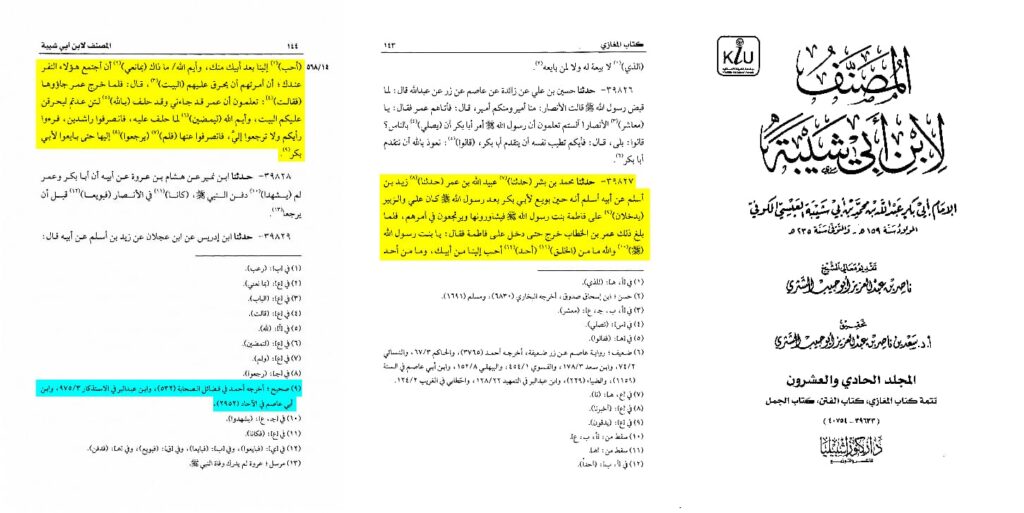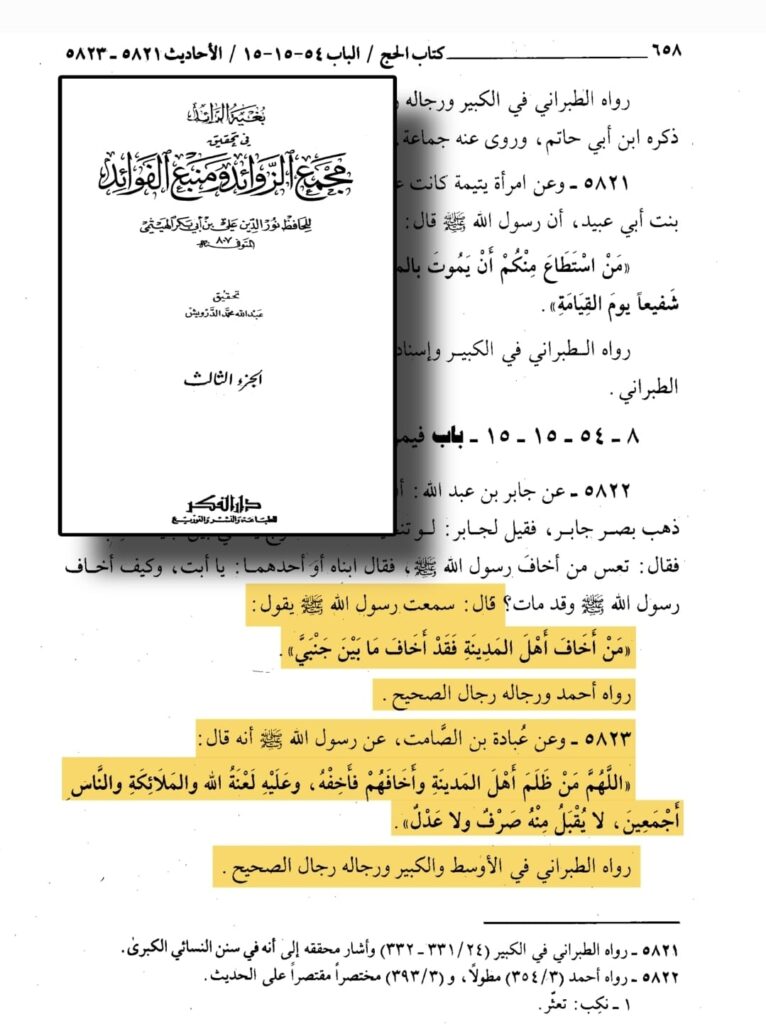Is the Threat of Umar ibn al-Khattab to Lady Fatima (peace be upon her) Not a Condemnable Act?
Nov 9, 2025 | Concise
Introduction
Some opponents insist that the “incident of the door” exists only in Shia narrations and claim there is no Sunni source. Yet, can the deliberate threat to burn down the house of Lady Fāṭimah (ʿalayhas-salām), the Prophet’s beloved daughter, the mother of al-Hasan and al-Husayn (ʿalayhimā al-salām), be excused or trivialized?
This is not merely a political disagreement. We are confronting an affront to the sanctity of the Prophet’s household, to the very soul of Islam, and a threat against the dignity of the Leader of the Women of the Worlds, Sayyidatun Nisāʾ al-ʿĀlamīn.
Consider the following narration from Sunni sources, Musannaf Ibn Abī Shaybah, Volume 13, pages 486–487, Hadith 38042:

The reference can be found in Majmaʿ al-Zawāʾid wa Manbaʿ al-Fawāʾid, Volume 3, page 658.
مُحَمَّدُ بْنُ بِشْرٍ ، نا عُبَيْدُ اللَّهِ بْنُ عُمَرَ ، حَدَّثَنَا زَيْدُ بْنُ أَسْلَمَ ، عَنْ أَبِيهِ أَسْلَمَ أَنَّهُ حِينَ بُويِعَ لِأَبِي بَكْرٍ بَعْدَ رَسُولِ اللَّهِ صَلَّى اللهُ عَلَيْهِ وَسَلَّمَ كَانَ عَلِيٌّ وَالزُّبَيْرُ يَدْخُلَانِ عَلَى فَاطِمَةَ بِنْتِ رَسُولِ اللَّهِ صَلَّى اللهُ عَلَيْهِ وَسَلَّمَ فَيُشَاوِرُونَهَا وَيَرْتَجِعُونَ فِي أَمْرِهِمْ ، فَلَما بلغ ذلك عمر بن الخطاب خرج حتى دخل على فاطمة فقال: «يا بنت رسول الله صلى الله عليه وسلم ، والله ما من أحد أحب إلينا من أبيك ، وما من أحد أحب إلينا بعد أبيك منك ، وايم الله ما ذاك بمانعي إن اجتمع هؤلاء النفر عندك ; أن أمرتهم أن يحرق عليهم البيت» ، قال: فلما خرج عمر جاءوها فقالت: تعلمون أن عمر قد جاءني وقد حلف بالله لئن عدتم ليحرقن عليكم البيت وايم الله ليمضين لما حلف عليه ، فانصرفوا راشدين ، فروا رأيكم ولا ترجعوا إلي ، فانصرفوا عنها فلم يرجعوا إليها حتى بايعوا لأبي بكر
Muhammad bin Bashir narrated from Ubaidllah bin Umar from Zaid bin Aslam that his father Aslam said: “When the allegiance (bay‘ah) went to Abu Bakr after the Messenger of Allah, Ali and Zubair were entering the house of Fatima to consult with her regarding their stance. When Umar learned of this, he went to Fatima and said:
‘O daughter of the Messenger of Allah! By Allah, no one is dearer to us than your father, and no one is dearer to us after your father than you. I swear by Allah, if these people gather in your house, nothing will prevent me from ordering that the house be burned and those inside it.’
When Umar left, Ali and Zubair came to Fatima, and she said: ‘Do you know that Umar came here and swore by Allah to burn the house if you gathered here? I swear to God, he will carry out his oath. Leave wisely, and do not gather here again.’ So they left and did not return until they gave allegiance to Abu Bakr.”
All narrators are reliable, appearing in chains also found in Sahih Bukhari and Sahih Muslim.
Objection
Some argue:
“The Prophet (ṣ) threatened to burn the houses of those neglecting congregational prayer, yet did not act. Similarly, Umar threatened Fatima’s house but did not follow through. Therefore, the two situations are equivalent.”
Reply One: Refuting the Objection
This analogy collapses under both moral and logical scrutiny. The Prophet’s warning was addressed to those neglecting a communal obligation, aiming to correct behavior and preserve the spiritual fabric of the community, not to intimidate or violate personal sanctity. In contrast, Umar’s threat was directed at the house of Fatima (ʿalayhas-salām), the Prophet’s daughter and the mother of his grandchildren, making it a deliberate act of coercion and intimidation against the Prophet’s household. To threaten her home is, in essence, to threaten the Prophet himself, for he declared:
فَاطِمَةُ مِنِّي يُؤْذِينِي مَا آذَاهَا
Fatima is a part of me. He who harms her harms me. (Source: Sahih Muslim 2449b)
The Prophet also commanded:
لَا يَحِلُّ لِمُسْلِمٍ أَنْ يُرَوِّعَ مُسْلِمًا
It is not lawful for a Muslim to frighten another Muslim. (Source: Sunan Abi Dawud, Hadith 5004)
If terrorising an ordinary Muslim is forbidden, what of the beloved daughter of the Prophet? Equating the Prophet’s corrective warning with Umar’s act of intimidation is morally outrageous and logically untenable.
Reply Two: Moral Analogy and Qur’anic Condemnation
Comparing the Prophet’s warning to Umar’s threat is like comparing a doctor warning a patient to take medicine to an arsonist threatening a maternity ward. One seeks preservation and guidance; the other threatens destruction and violates sacred trust. The Qur’an declares:
إِنَّ ٱلَّذِينَ يُؤْذُونَ ٱللَّهَ وَرَسُولَهُۥ لَعَنَهُمُ ٱللَّهُ فِى ٱلدُّنْيَا وَٱلْءَاخِرَةِ وَأَعَدَّ لَهُمْ عَذَابًا مُّهِينًا (Al-Ahzab: 57)
Indeed, those who abuse Allah and His Messenger, Allah has cursed them in this world and the Hereafter and prepared for them a humiliating punishment.
Threatening Fatima’s home, even without execution, constitutes a grave sin that defiles sanctity, causes spiritual anguish, and invites divine wrath. Furthermore, we invite our readers to consider these 4 Hadith:
Hadith 1
عن أَبِي عَبْدِ اللَّهِ الْقَرَّاظِ أَنَّهُ قَالَ أَشْهَدُ عَلَى أَبِي هُرَيْرَةَ أَنَّهُ قَالَ قَالَ أَبُو الْقَاسِمِ (صلى الله عليه وآله):
مَنْ أَرَادَ أَهْلَ هَذِهِ الْبَلْدَةِ بِسُوءٍ – يَعْنِي الْمَدِينَةَ – أَذَابَهُ اللَّهُ كَمَا يَذُوبُ الْمِلْحُ فِي الْمَاءِ.
Abu Hurayrah reported that the Messenger of Allah (s) said:
“Whoever intends harm toward the people of this city (Madinah), Allah will dissolve him as salt dissolves in water.”
Source: Sahih Muslim, Vol. 2, p. 1007, Hadith 1386, Kitāb al-Ḥajj, “Bāb man arāda ahl al-Madīnah bisūʾ adhābahu Allāh.”
Hadith 2
قَالَ يَزِيدُ بْنُ الْهَادِ، عَنْ أَبِي بَكْرِ بْنِ الْمُنْكَدِرِ، عَنْ عَطَاءِ بْنِ يَسَارٍ، عَنِ السَّائِبِ بْنِ خَلَّادٍ، أَنَّهُ سَمِعَ رَسُولَ اللَّهِ (صلى الله عليه وآله) يَقُولُ:
مَنْ أَخَافَ أَهْلَ الْمَدِينَةِ أَخَافَهُ اللَّهُ، وَعَلَيْهِ لَعْنَةُ اللَّهِ وَالْمَلَائِكَةِ وَالنَّاسِ أَجْمَعِينَ.
The Messenger of Allah (s) said:
“Whoever frightens the people of Madinah, Allah will frighten him, and upon him is the curse of Allah, the angels, and all people.”

Source: Tārīkh al-Islām, by al-Dhahabi, Vol. 5, p. 26.
Authenticated by al-Albānī in Al-Silsilah al-Saḥīḥah, Vol. 5, p. 382, no. 2304.
Chain of Transmission:
-
Yazid ibn ‘Abd Allah ibn Usamah ibn al-Hād: Thiqah (trustworthy) — Taqrib al-Tahdhib, 1/602, no. 7737.
-
Abu Bakr ibn al-Munkadir: Thiqah — Taqrib al-Tahdhib, 1/624, no. 7989.
-
‘Ata ibn Yasar: Thiqah, virtuous, devout preacher — Taqrib al-Tahdhib, 1/392, no. 4605.
The same narration also appears in Al-Muʿjam al-Kabīr by al-Ṭabarānī, Hadith 6497–6499.
Hadith 4
مَنْ أَخَافَ أَهْلَ الْمَدِينَةِ أَخَافَهُ اللَّهُ، وَعَلَيْهِ لَعْنَةُ اللَّهِ وَالْمَلَائِكَةِ وَالنَّاسِ أَجْمَعِينَ.
“Whoever frightens the people of Madinah, Allah will frighten him, and upon him is the curse of Allah, the angels, and all people.”
Source: Musnad Ahmad, Hadith 16559 — Authentic chain (Isnād ṣaḥīḥ).
If even the general residents of Madinah are protected, what then of the heart of Madinah, the home of Fatima, Ali, and their sons, al-Hasan and al-Husayn (ʿalayhimā al-salām)?
Conclusion
The attempt to defend Umar ibn al-Khattab’s threat is morally indefensible and historically disturbing. It diminishes the sanctity of Lady Fatima (ʿalayhas-salām), belittles the crime against the Prophet’s household, and attempts to normalize one of the darkest injustices in Islamic history. Even if the threat was not carried out, hesitation does not erase the moral horror. The act itself, intimidating the home of the Prophet’s daughter, the mother of his grandchildren, and part of his very being, is a violation of Islam’s core ethics.
Reflect deeply: can faith tolerate the terrorizing of the Prophet’s family, even once, even symbolically? To defend Umar’s threat under the pretext of analogy is moral blindness, an affront to the Qur’an, Sunnah, and the Prophet’s explicit commands. It defies logic, reason, and conscience, staining the moral fabric of Islam and challenging the eternal principles of justice, honor, and sanctity that the Qur’an and Sunnah enshrine. Those who attempt to justify this act are, in effect, defending the intimidation of the very household of the Messenger of Allah, an offense for which divine and human accountability is profound and unavoidable.
Written by Sayyid Khayr Talib Zaydi (hafizahullah)
Edited and Enhanced by Abdullah Imami, Shiapen


